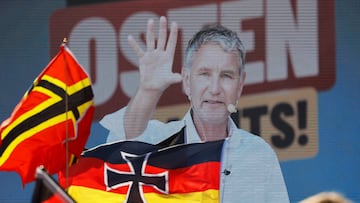Is Germany’s far-right group AfD a Nazi party?
The AfD has won big in two East German states this week, but the electoral success comes after the party’s racist and anti-Semitic rhetoric has left them isolated on the European political landscape.


Alternative for Germany (AfD), the far-right political party, has won its first major electoral victory in regional elections this week. Since its inception in 2011, the AfD has been accused of reviving Nazism and fascism, and its leaders have not attempted to play down those accusations. Additionally, in a country like Germany, where Adolf Hitler was elected democratically, the rise of a popular far-right party creates concerns capitals around Europe.
Thuringia, a state that used to form part of East Germany, was the site of the elections that handed the AfD this victory, with the party garnering 32.8 percent of the vote. Germany’s largest political parties, the Christian Democratic Union (CDU) and the Social Democratic Party of Germany (SPD), received 23.6% and 6.1 percent, respectively. These parties and others, including The Left (13.1 percent) and another left-wing party, Bündnis Sahra Wagenknecht (BSW- 15.8 percent), have said they plan to lock the AfD out of whatever coalition government is established in light of the results. However, with the votes spread amongst parties whose ideologies vary widely, forming such a coalition will be a feat of political negotiation and compromise.
Germany, Thuringia regional parliament election today:
— Europe Elects (@EuropeElects) September 1, 2024
Infratest dimap exit poll (among 18-24 year olds)
AfD-ESN: 38%
LINKE-LEFT: 16%
CDU-EPP 13%
BSW-NI: 12%
SPD-S&D: 7%
GRÜNE-G/EFA: 6%
➤ https://t.co/obOCVirJfd #ltwth #thueringenwahl2024 pic.twitter.com/0xAwuUFAUW
In Saxony, the AfD lost by less than a percentage point to the CDU, with the far-right party garnering thirty percent of the vote. Like in Thuringia, the other political parties have vowed to keep the AfD out of government, but political analysts do not expect that process to be easy.
Björn Höcke, the AfD leader in Thuringia
Björn Höcke, the leader of the party’s Der Flügel (in English—The Wing) faction, is AfD’s leader in Thuringia. Germany’s public radio, Deuchlandfunk, has said that Der Flügel has been engaged in “historical revisionism” in an attempt to undermine the moral abhorrence of National Socialism, or Nazism. The faction stands accused of weaponizing “racism, Islamophobia, anti-Semitism, [and] xenophobia” to explain the current troubles Germany is facing. Höcke has been accused of anti-semitism on a number of occasions. One of the most controversial moments came during a speech in 2017 where he railed against a monument to the Holocaust being built in the middle of Berlin and described the work of the German government to atone for its Nazi past as “re-education that began in 1945.”
More recently, charges were brought against Höcke for a 2021 speech where he used the Nazi slogan “Everything for Germany!” Use of Nazi rhetoric is banned in Germany, and although Höcke tried to argue that he was ignorant of the slogan’s meaning or history, a court found him guilty and imposed a 13,000 euro fine on him.
Europe’s far-right steps away from the AfD
Many of the European countries that the Nazis occupied during World War II have far-right parties that deploy many of the same anti-immigrant, racist, sexist, homophobic language when making their case to the voters. The difference is that the AfD’s positions are considered so extreme that other right-wing parties will not work with them over fears that their image could be tarnished.
Earlier this year, the leader of France’s far-right party, National Rally, Marie Le Pen, said her members in the European Parliament would be cutting ties with the AfD. France fought the Nazis in World War II, and even far-right figures were off-put by comments made by Maximilian Krah, an AfD leader in Brussels, who said that he would “never say that everyone who wore an SS uniform was automatically a criminal.” The Czech Freedom and Direct Democracy Party followed Le Pen’s move and announced shortly before the June elections that they would not be campaigning with the AfD. The comments by Krah came after news broke that the German party had held a meeting where the representatives spoke seriously about a plan to remove non-ethnic Germans, including citizens.
German Chancellor Olaf Scholz, a member of the SPD, condemned the party for even considering such proposals.
Wir lassen nicht zu, dass jemand das „Wir“ in unserem Land danach unterscheidet, ob jemand eine Einwanderungsgeschichte hat oder nicht. Wir schützen alle - unabhängig von Herkunft, Hautfarbe oder wie unbequem jemand für Fanatiker mit Assimilationsfantasien ist. (1/2) #Correctiv
— Bundeskanzler Olaf Scholz (@Bundeskanzler) January 11, 2024
Related stories
“We will not allow anyone to distinguish the “we” in our country based on whether someone has an immigration history or not,” said the Chancellor in a social media post.
As next year’s elections approach, Scholz has his work cut out for him. Facing fierce competition from the right and the left of the country’s political spectrum, he and other SPD officials will need to determine a unique path forward.
Complete your personal details to comment